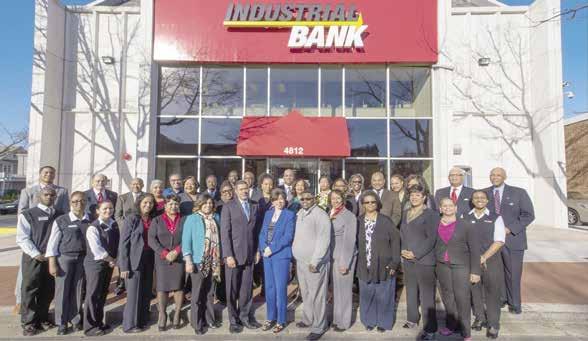
8 minute read
Business
Stacy M. Brown WI Senior Writer
Technology has become an essential tool for Community Development Financial Institutions (CDFIs) and Minority Depository Institutions (MDIs).
Yet CDFIs and MDIs have historically been unable to secure and operate technology tailored to their needs and enabling them to scale and serve their communities fully.
Many are asking can Black-andBrown-owned banks compete in a digital economy?
It is a question that panelists hope to answer during a Juneteenth summit hosted by Georgetown Law’s Institute for International Economic Law.
“The forum will serve as the first in a series of cutting-edge programs, culminating in Washington’s annual Fintech Week conference, designed to tackle long standing obstacles of financial inclusion and access,” officials noted.
Some experts believe they already know the solution.
“If Black and Brown banks are going to be able to compete in a digital economy, they will have to start using social media, updating their banking systems, and competing with other community and large-scale banks,” said Olivia Tan, co-founder of Coco Fax.
Tan’s startup provides fax solutions for businesses.
“To attract the next generation of consumers, Black and Brown banks, like many community banks, must realize the need to offer mobile apps and become more social media savvy,” Tan continued.
Reportedly, from 2001 to 2007, the number of Black-owned banks declined from 48 to 44, followed by a 50 percent decrease after the
TWO RIVERS PUBLIC CHARTER SCHOOL REQUEST FOR PROPOSALS Payroll Processing and HRMS Services
Two Rivers is seeking to procure a vendor to provide Payroll Processing and HRMS Services. To request a copy of the RFP, please email Mary Gornick at procurement@tworiverspcs.org.
5 The survival of Black-owned banks, like Industrial Bank, could come down to whether they have the technology to make it. (Photo courtesy/WeBuyBlack) Great Recession.
According to some estimates, by mid-2020, there were only 20 Black-owned banks in the U.S., with combined total assets of $5.45 billion. By contrast, commercial banks number more than 5,000, with the largest bank in the U.S., JPMorgan Chase & Co., holding assets of $2.8 trillion.
Economist Eldar Beiseitov wrote in a blog that “calls for racial economic equity, including #BankBlack, have increased after the police killings of African Americans George Floyd and Breonna Taylor last year.”
“The #BankBlack movement is already having an impact, with some banks reporting an enormous uptick in deposits. The rise in deposits is attributed to a wave of new individual customers and nonprofit and community organizations that now choose Blackowned banks and credit unions,” Beiseitov wrote.
Corporations also promised to make more deposits with Blackowned banks, he added. The investment could also help Blackowned banks weather an expected increase in the shares of non performing real estate and small-business loans caused by the pandemic, he continued.
“Scholars and policymakers agree that encouraging greater access to mainstream financial services is critical to closing the racial wealth gap,” Beiseitov wrote.
“Black-owned banks have demonstrated an unwavering commitment to their communities and could play a vital role in equitable economic recovery.” In March 2020, https://www. washingtoninformer.com/wellsfargo-completes-investments-in13-black-owned-banks-fulfilling50-million-pledge-made-in-2020/ Wells Fargo announced it would put as much as $50 million in Black-owned banks, which would then have access to financial and technological help and product development. The company said this would help to “grow and benefit their local community.” Wells Fargo officials noted that communities of color had been disproportionately affected, and this investment is part of the company’s effort to generate a more inclusive recovery across the country,” the release says. The Wells Fargo initiative includes Broadway Federal Bank, in Los Angeles, Calif., Carver Federal Savings Bank, in New York, N.Y.; Citizens Savings Bank & Trust, in Nashville, Tenn.; Commonwealth National Bank, in Mobile, Ala.; M&F Bank, in Durham, N.C.; and Optus Bank, in Columbia, S.C. In April 2021, Wells added more minority-owned banks to its initiative including, Carver State Bank in Savannah, Ga.; Citizens Trust Bank in Atlanta, Ga.; First Independence Bank in Detroit, Mich.; Liberty Bank in New Orleans, La.; and Unity National Bank in Houston, Texas. Wells Fargo also supports each MDI’s development through a banking relationship in the form of a single touchpoint coverage model. The model will help them access Wells Fargo’s expertise and pursue strategic priorities like entering new markets, expanding locations, designing new products, and hiring staff to support loan growth. Investments like these are critical for minority-owned banks to offer mobile apps and become more fluent in social media. Some argue that much more is needed. “I think there are wonderful solutions that exist today that help people live financially well, resulting in financial institutions having strong relationships with their clients,” said Eddie Ortiz, CEO & Founder of Press Play Finance LLC. “I just believe there is a better way for financial institutions to create new pathways and intelligent ways that help people, particularly people of color, take charge of their finances,” Ortiz asserted. “And it’s not all on financial institutions like CDFIs & MDFIs. "I believe new and existing FinTech/FinEd solutions must step up to the plate to create tailored digestible personal financial content that is in-culture and in-language to help people understand basic financial concepts so we can take a more collaborative approach to tackling the longstanding obstacles of financial inclusion, access, and general social inequality.” WI
Congressional Black Caucus PAC Endorses Val Demings for U.S. Senate 2022 Election
Congresswoman Prepares for Face-off with GOP Senator Marco Rubio
D. Kevin McNeir WI Senior Editor
running for the United States Senate because of two simple words: never tire.” WI
The Congressional Black Caucus @mcneirdk [CBC] PAC recently announced their endorsement of Congresswoman Val Demings in her bid for the “When you grow up in U.S. Senate. Should she be successful in her the South poor, Black efforts, Demings would become the and female, you have to first Black woman to represent the state of Florida in the U.S. Senate have faith in progress Congressman Gregory Meeks, CBCPAC chair, said, “Val is a proven and opportunity.” leader and champion for the American people. She has fought for her constituents of Florida’s 10th congressional district with grace and dignity. We know that Florida needs and deserves a public servant ready to serve the people with truth and honor. This is who she has been for her entire life and it is an honor to support her.”
“With Vice President Harris in the White House, the Senate is missing the needed perspective of a Black woman. Rep. Demings has been a leader within not only the CBC but also the larger Democratic Caucus. She is a proven cham5 Val Demings (Courtesy photo) pion the people of Florida deserve and will represent them with honor and integrity.” CBCPAC Executive Director Yolonda Addison said.
“When you grow up in the South poor, Black and female, you have to have faith in progress and opportunity,” Demings said. “My father was a janitor and my mother was a maid – [I learned to] never tire of doing good, never tire. I’ve never tired of representing Florida, not for one single moment. I’ve never tired of standing up for what I believe is right. Now I’m 5 Marco Rubio (Courtesy photo)

A Time to Commemorate the Past and Built the Future
Aimee D. Griffin, Esq.,
This month we will recognize and mourn that 100 years ago there was the destruction of Black Wall Street /Tulsa Massacre and Juneteenth. The Greenwood District was noted for its affluent and progressive Black community. Tulsa was described as the wealthiest U. S. Black community in 1921. The town was founded by descendants of slaves and was a harbor for African Americans in segregation. The massacre 100 years ago burned the Greenwood section to the ground and reportedly up to 300 Black people were killed and 1,000 business and homes were burned down.
This is also the month where we commemorate Juneteenth. This is the holiday celebrating the emancipation of those who had been enslaved.
This is a month where we celebrate surviving horrendous actions that have been taken against Black people. This is a month where we celebrate that we are more than conquerors. We have endured much, and the best is yet to come. As we lift every voice and sing, we sing a song full of the faith that the dark past has taught us. We sing a song full of the hope that the present has brought us.
At The Griffin Firm we celebrate every individual and family with whom we work as Estate Planning attorneys. As we identify and build upon the history of the family we acknowledge the blood, sweat and tears of the ancestors and create platforms for the future generations. We celebrate the victory and recognize that simply living in these United States as Black people should, many times, justify a trophy. Yet, as we have seen in the Greenwood Massacre, success is often met with greater violence and oppression.
We are indeed a remarkable people. Black people have continued to survive in spite of the redlining, in spite of mass incarceration, in spite of financial exploitation, in spite of being killed for being Black. And yet, Still, we rise.
As Black people we must advocate for equality because no one will enforce Black Lives Mattering if we don’t fight for it. Systematic racism will continue to exist as we know that power concedes nothing without a demand unless we fight for change. Fighting for equality and reparations must be a continuous steadfast effort. The system was created to maintain the status quo.
In our individual capacity each Black person can be strategic to build the success strategy for our families and communities for a greater Black community. We must take advantage of the opportunity to propel our children and our children’s children to the next level by charting the course and providing resources for greatness. We can take advantage of the rules and laws that have provided opportunity for others and employ them for ourselves. Greenwood was an example of greatness because collectively they supported the Black excellence that was a part of the community.
Our remembrance of the atrocities, current as well as the past, should compel us to make our tomorrows even greater. We have the power to build the future celebrations for our families and our communities not about surviving but thriving!





